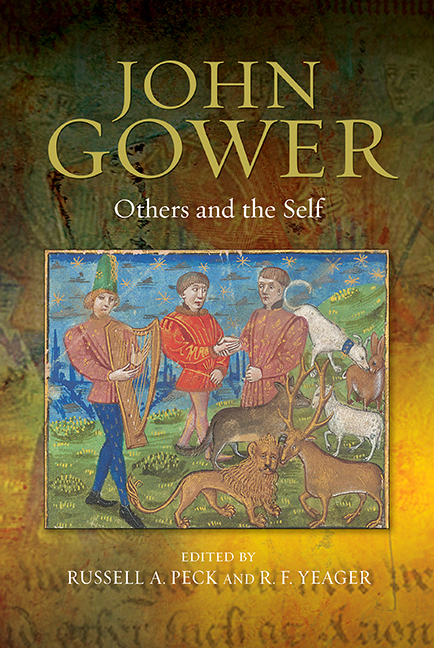Book contents
- Frontmatter
- Contents
- List of Illustrations
- Abbreviations
- Introduction
- PART I KNOWING THE SELF AND OTHERS
- PART II THE ESSENCE OF STRANGERS
- PART III SOCIAL ETHICS, ETHICAL POETICS
- 11 Gower's Governmentality: Revisiting John Gower as a Constitutional Thinker and Regiminal Writer
- 12 Gower's Speculum Iudicis: Judicial Corruption in Book VI of the Vox Clamantis
- 13 “The Lucre of Marchandie”: Poet, Patron, and Payment in Gower's Confessio Amantis
- 14 Hidden Matter in John Gower's Confessio Amantis
- 15 Writing the Cinkante Balades
- 16 Gower in Early Modern Spanish Libraries: The Missing Link
- Bibliography
- Index
- VOLUMES ALREADY PUBLISHED
16 - Gower in Early Modern Spanish Libraries: The Missing Link
from PART III - SOCIAL ETHICS, ETHICAL POETICS
Published online by Cambridge University Press: 30 April 2019
- Frontmatter
- Contents
- List of Illustrations
- Abbreviations
- Introduction
- PART I KNOWING THE SELF AND OTHERS
- PART II THE ESSENCE OF STRANGERS
- PART III SOCIAL ETHICS, ETHICAL POETICS
- 11 Gower's Governmentality: Revisiting John Gower as a Constitutional Thinker and Regiminal Writer
- 12 Gower's Speculum Iudicis: Judicial Corruption in Book VI of the Vox Clamantis
- 13 “The Lucre of Marchandie”: Poet, Patron, and Payment in Gower's Confessio Amantis
- 14 Hidden Matter in John Gower's Confessio Amantis
- 15 Writing the Cinkante Balades
- 16 Gower in Early Modern Spanish Libraries: The Missing Link
- Bibliography
- Index
- VOLUMES ALREADY PUBLISHED
Summary
In the 1760s, an English recusant who ended his days in Spain put together a series of biographies of Old and Middle English writers. One of the authors portrayed is John Gower, who is presented as:
an excellent English poet & esteemd the first Polisher of English Language, and what is saying all in one, was master and Guide to the Great Chaucer, but his poetry was all serious and Christian, whence Chaucer calls him the morall Gower.
This unpublished manuscript is the earliest known reference to John Gower to be found in Spain throughout the early modern period, despite the fact that two of the most important libraries in the country have copies of the medieval Portuguese and Castilian translations of the Confessio Amantis. Actually, it is with a certain perplexity that we discover the first published notice of any of these translations in Spain only at the end of that same century, in an appendix to a bibliographical compilation.
The location of the two Iberian Confessios among the holdings of, on the one hand, the Royal Library in Madrid (the Portuguese manuscript) and, on the other, the Royal Library of El Escorial (the Castilian manuscript) has tended to be unquestionably associated with what is common assent among scholars: the Lancastrian affiliation of both translations through John of Gaunt's daughters, Philippa and Catherine, who were married, respectively, to the kings of Portugal and Castile. Thus, the Iberian reception of Gower's Confessio Amantis within the context of the monarchy has been taken for granted, even for the two extant manuscripts. However, some recent codicological studies are offering new views on the scribal contexts of these manuscripts as well as on the history of their early ownership. The purpose of my essay is to examine these findings from a heretofore unexplored perspective: the early modern reception of the Iberian copies of the Confessio. The fact that these royal libraries were only founded in the early modern period makes us wonder about the fortune of the two manuscripts between the fifteenth century—when they were copied—and the time when they were acquired for those collections.
- Type
- Chapter
- Information
- John Gower: Others and the Self , pp. 329 - 344Publisher: Boydell & BrewerPrint publication year: 2017
- 1
- Cited by

